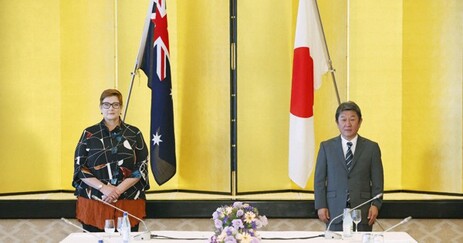 Marine Payne and Motegi Toshimitsu. Source: Mainichi.com
Marine Payne and Motegi Toshimitsu. Source: Mainichi.com As Chief Cabinet Secretary, Suga himself was certainly known to Australian diplomatic and political staff, but his profile in general had been largely limited to a domestic one. Being the scion of an ordinary middle class family with a farming background, Suga was not raised as part of a political dynasty and has no record of having studied or worked abroad in his youth. Suga has also not overtly expressed an interest in diplomacy or written about foreign affairs at length. Hence his selection as prime minister has fuelled speculation on what Australia might expect him to do as the leader of Australia’s ‘special strategic partner’ in the north.
A majority of Australian content about Suga focuses on Abe Shinzo’s achievements with Australia and the expectation that Suga will seek to continue the trend towards closer security ties begun by his predecessor. Others have speculated that since Suga is expected to call a general election in 2021, it is still far too early for Australia to have much invested in a relationship with Suga until he is able to firmly cement his place as PM through popular endorsement. This would explain why, after being selected as PM, most Australian commentary has concentrated on Suga’s role as one of Japan’s longest serving Chief Cabinet Secretaries but without any analysis as to whether this would prove beneficial to Australia’s interests in forging closer ties with Japan. To date, one of the most revelatory pieces of information concerning Suga and Australia is that he has a fondness for Bill Granger’s pancakes, which is certainly interesting as trivia but not exactly grounds for hope for a close bilateral relationship.
More substance has been provided by newly (re) appointed Defence Minister Kishi Nobuo (Kishi served as defence minister under Aso Tarō) and re-appointed Foreign Minister Motegi Toshimitsu. Motegi is better known to Australia, having been brought in as the successor to Kono Tarō in September last year, and who has spent the past year advocating for the bilateral relationship as part of the Abe and Suga governments. Motegi appears to have a good, steady working relationship with Marise Payne, which bodes well for progress in bilateral and multilateral discussions at regional fora. Kishi Nobuo is, as is commonly known, the younger brother of Abe Shinzo, and has something of a history of interaction with Australia. As Deputy Foreign Minister he visited Australia briefly in 2017, and met with representatives of the Australian parliament during their visit to Japan.
Furthermore, during his time working for the Sumitomo Corporation he was dispatched to work in Australia with responsibility for procuring trade in food products. This would have given Kishi direct experience of Australia’s corporate and political culture, as well as giving him a unique link to Australia. Many of Japan’s foreign and defence ministers have histories of having worked and/or studied in either the US or Europe, but very, very few have had any interaction with Australia before entering politics and being promoted into ministries.
As Chief Cabinet Secretary Suga did not speak all that often about Australia, but when he did it was generally positive, with a view to advocating Abe Shinzo’s position of Australia being Japan’s ‘special strategic partner’. That view did not change even when Japan missed out on being selected for the Future Submarine Program, which Suga described as being “greatly disappointing” but which would not change Japan’s desire for closer relations with Australia. It is also telling that Suga chose to speak with Scott Morrison first among all world leaders – itself unprecedented in Australia-Japan relations, and an indication of just how much Suga is prepared to invest in the growing relationship between both countries. That level of attention to Australia has apparently be reciprocated by Scott Morrison, with his positive tweet concerning Suga’s visit to Vietnam and Indonesia on his first overseas trip as PM.
Whether this camaraderie continues remains to be seen, but it does indicate that Canberra and Tokyo are far more attuned to one another’s activities and share more interests than at any other time in the history of bilateral relations between both countries. The fact that Scott Morrison is considering visiting Tokyo in November, which would constitute his first overseas visit anywhere since the Coronavirus hit, is evidence that the dynamic between both countries is changing.
In addition, Canberra recently announced the appointment of Jan Adams as the next ambassador designate to Japan. Adams is one of Australia’s most experienced diplomats, with an extensive work history in north Asia, including as Australia’s ambassador to China. The fact that she has been chosen for Tokyo is indicative of the level of importance that Canberra has placed in its relationship with Japan, as Adams has the ear of both Marise Payne and PM Morrison and is a champion at negotiating trade deals. Although her work will be more focused on strengthening the security relationship between both countries, her presence in Tokyo will help to draw more Japanese investment into Australia, thus helping to offset some of the losses felt as a result of China’s economic punishment of Australia and the desire by the Australian government to diversify Australian exports away from over-reliance on the Chinese market.
 RSS Feed
RSS Feed